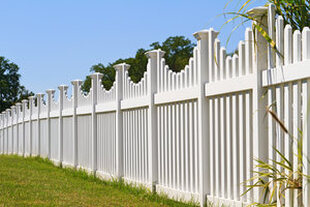Vinyl fence contractors Cambridge ON
Although it’s hard to argue the natural beauty of wood fencing, many home and business owners are looking for an alternative fencing material that has enhanced features while still appearing attractive. Vinyl fits that bill. You’re looking at a very durable product that can last 30 years, with very low porosity so bugs can’t get in and something you can just hose down with your backyard garden hose to clean and maintain your vinyl fence.
Based on all the features, is vinyl fencing better than wood? For many homeowners, the answer is a resounding yes. However, you’ll find some consumers who beg to differ, especially if you’re comparing vinyl’s features with a strong, sturdy, low maintenance and beautiful wood like cedar. So it’s important to compare apples to apples. Cedar fencing also has an average lifespan of 30 years, resists rot and is low maintenance. So what other factors can influence your decision between a cedar fence and a vinyl fence, both with comparable features? Cost - vinyl is generally more expensive than wood, but a vinyl fence installation cost can be cheaper because it requires less time and involvement to install. So when talking about vinyl fences, the material is more expensive, but the labour cost may be less costly. However, you’re still likely looking at higher total upfront cost with vinyl fencing installation. Furthermore, if you’re factoring ongoing costs, it depends on how you look at it. Vinyl fencing lasts roughly three decades, but so can cedar if properly maintained. Not so much with pine, which lasts an average of 15 years. But if the vinyl cracks and you’re in need of a vinyl fence repair, this is for sure more expensive than repairing a cracked wood fence. So what’s the verdict on cost? Vinyl fencing is in general more expensive than wood. |
Environment - if using man-made materials is a concern, then vinyl may not be the best choice if biodegradability is a factor for you. Wood is biodegradable, but what happens to the vinyl fence once it’s ripped out and replaced? It goes straight to the landfill.
Weather-resistance - in extreme temperature fluctuations, which is a common phenomenon in Canada, vinyl doesn’t fare as well as cedar wood fencing. The vinyl can expand, contract or bend leading to more frequent repairs. And repairing vinyl fences is not as simple as removing a single post - you’d have to remove the entire panel and replace it.
You can see both vinyl and wood each have their pros and cons. There’s no mistaking, however, vinyl fencing’s very lengthy lifespan, its low maintenance schedule and its resistance to rot, fungus and decay. It’s a great choice for fuss-free and attractive fencing.
If you’re “on the fence” about what material to choose, give our vinyl fence contractors in Cambridge a call and we can discuss your options and make recommendations based on your budget, aesthetics preference, tolerance for upkeep and other factors. You don’t have to decide on this alone - we’ll go over the pros and cons of each material in further detail so that you can make an informed decision.
Weather-resistance - in extreme temperature fluctuations, which is a common phenomenon in Canada, vinyl doesn’t fare as well as cedar wood fencing. The vinyl can expand, contract or bend leading to more frequent repairs. And repairing vinyl fences is not as simple as removing a single post - you’d have to remove the entire panel and replace it.
You can see both vinyl and wood each have their pros and cons. There’s no mistaking, however, vinyl fencing’s very lengthy lifespan, its low maintenance schedule and its resistance to rot, fungus and decay. It’s a great choice for fuss-free and attractive fencing.
If you’re “on the fence” about what material to choose, give our vinyl fence contractors in Cambridge a call and we can discuss your options and make recommendations based on your budget, aesthetics preference, tolerance for upkeep and other factors. You don’t have to decide on this alone - we’ll go over the pros and cons of each material in further detail so that you can make an informed decision.


